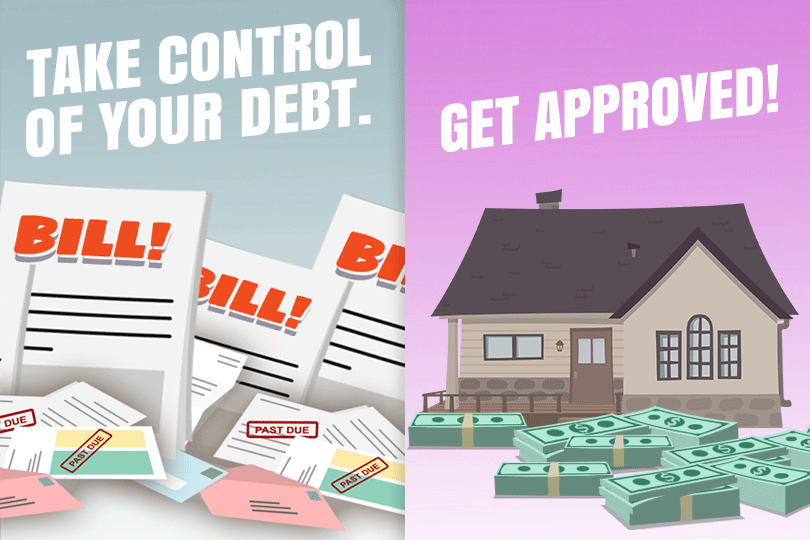Getting Approved for an FHA Loan
June 8, 2021
Credit Scores and Down Payments
The lower credit score and down payment requirement is one of the prime features that draws borrowers to apply for an FHA loan. The FHA stipulates that borrowers with a FICO score of at least 580 are eligible for the low- down payment minimum of 3.5% down payment. Those with scores between 500 and 579 must pay at least 10% for the down payment, which is still less than the usual 20% minimum for most conventional loans with no private mortgage insurance.
Mortgage Insurance Premiums
To help protect lenders from the losses in the case of borrowers defaulting on their loans, while continuing to offer high-risk borrowers flexible home loans, the FHA requires that all borrowers pay a Mortgage Insurance Premium (MIP). MIP is paid monthly, along with the monthly mortgage payments. Borrowers are also required to pay a one-time, Upfront Mortgage Insurance Premium (UFMIP) at closing, which is usually 1.75% of the loan amount. The annual MIP cost depends on the length of the loan, the loan-to-value ratio, and when the loan was originated. It’s important that borrowers know about this added cost before applying, so they don’t face any unexpected surprises later on.
Debt-to-Income Ratio
While the FHA has no minimum income requirement, it sets a maximum debt-to-income ratio to determine whether borrowers have sufficient funds to keep up with monthly payments. According to HUD Handbook 4000.1, FHA borrowers can have a “maximum qualifying ratio” 43%. This is calculated by adding up the total mortgage payment for the new home, as well as any recurring monthly debt. This includes principal and interest, escrow deposits for taxes, hazard insurance, mortgage insurance premium, as well as car loans, personal loans, student loans, credit cards, etc. That number is divided by the borrower’s gross monthly income. The result should fall under 43% to qualify for an FHA loan.
FHA Limits
The FHA has a maximum loan amount that it will insure. These limits vary by county and property type, and are updated every year based on conventional loan limits set by Fannie Mae and Freddie Mac. This limit that borrowers fall under is a huge determining factor in not just their home choice, but also if they decide to get an FHA mortgage.
Property Types
It may surprise many borrowers to learn that the FHA insures loans to purchase many different property types, and there are specific programs to suit those needs. The FHA offers Condo Loans, One-Time Construction Loans for new construction, and also Rehab Loans for fixer-uppers. The main rule to know is that any home purchased with an FHA loan must serve as the borrower’s primary residence. Investment properties are not eligible. There are exceptions for mixed-use properties, with at least 51% of the space dedicated to residence.
If you are interested in applying for an FHA loan, talk to your loan officer to see if you meet all the requirements, and figure out if it is the best option for you!
------------------------------
RELATED VIDEOS:
Understand the Reasons for Private Mortgage Insurance
Carefully Read Your Closing Disclosure
Buying a Home With a Co-Borrower

FHA Loan Articles
April 16, 2025There are smart uses for cash-out refinancing loan proceeds and uses for that money that may work against the borrower. We examine some of those choices below, starting with using an FHA cash-out refinance for investment purposes. Is this a good idea?
April 15, 2025House hunters sometimes face a curveball when the appraisal for a home they want to buy with an FHA mortgage is lower than the offer. Is this a deal-breaker? Believe it or not, it isn't the end of the road. A low appraisal can sometimes be just a bump in the road. In other cases, you may wish to walk away from the deal. Here's your game plan to navigate this situation...
April 14, 2025 Buying a home with an FHA loan can be an exciting and achievable goal. This quick quiz helps you gauge your understanding of FHA loans and what it takes to make a winning offer on your new dream home. Take a few moments to answer the questions and see how prepared you are to navigate this crucial stage of your home-buying journey.
March 31, 2025Is 2025 the right year for you to consider an FHA streamline refinance? These mortgages are for those who want a lower interest rate, a lower monthly payment, or to move out of an adjustable-rate mortgage and into a fixed-rate loan. We examine some of the critical features of FHA streamline refinances.
March 27, 2025Did you know there are FHA loans that let house hunters buy multi-family properties such as duplexes and triplexes? FHA rules for these transactions is found in HUD 4000.1, including owner-occupancy, require that one unit serve as the borrower’s primary residence. Some house hunters ask why this rule exists. Some believe the rule serves as a lender risk mitigation strategy.







